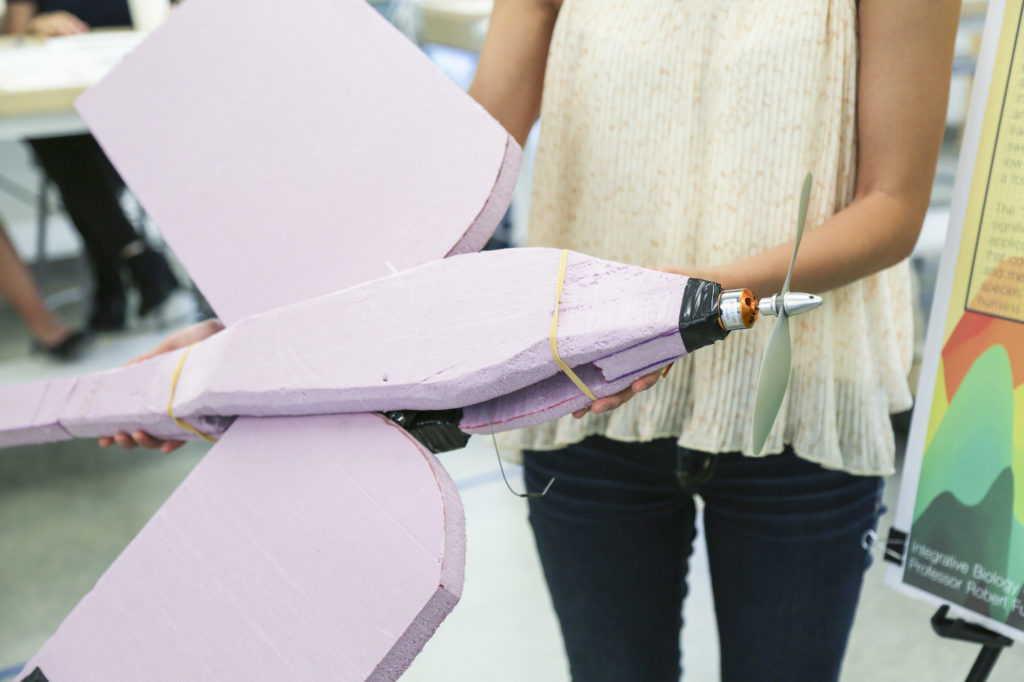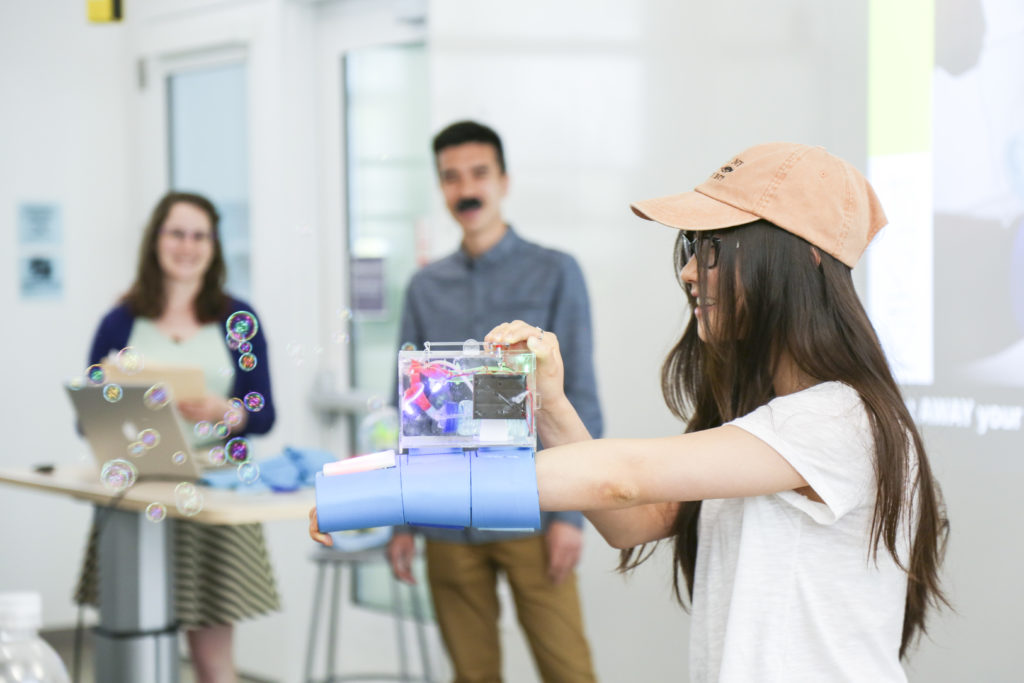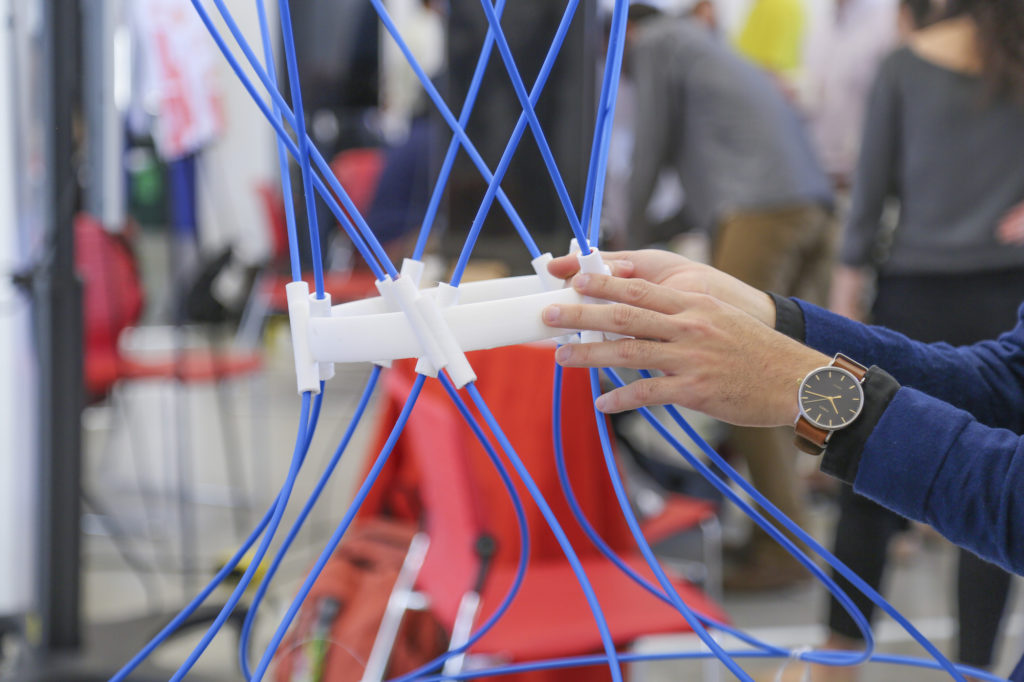
On Wednesday, May 2, and Thursday, May 3, join the Jacobs Institute for the Jacobs Spring Design Showcase. Featuring project displays and demos — along with conversation and refreshments — this lively open house is an opportunity to meet student makers, explore new creations, and take part in Jacobs Hall’s richly interdisciplinary community.
Over the course of two days, students in 17 courses, along with members of campus design clubs and other student makers, will share their work. With projects spanning a wide range of experience levels, academic departments, and areas of interest, the showcase will highlight the diversity of the design innovation ecosystem at Jacobs Hall and at Berkeley. All are welcome to attend — the showcase is free and open to the public.
The full schedule, comprising six open house sessions, is below. Throughout the two-day showcase, you can also explore displays and projects from student recipients of the Jacobs Institute Innovation Catalysts grants, who will be available for conversation on a rotating schedule.
User Interface Design
Check out the original interfaces student teams have created in this class, in which they have taken part in needs assessment, rapid prototyping, algorithmic implementation, and more.
User Experience Design
This studio course introduces students to design thinking and the basic practices of interaction design. See what students have created while exploring user interactions, use contexts, and larger systems.

Bioinspired Design
Bioinspired design views the process of how we learn from nature as an innovation strategy, translating principles of function, performance, and aesthetics from biology to human technology. Learn about diverse student teams’ work on original bioinspired design projects.
Global Product Development
In this course, students have explored the process of translating a functional prototype into a commercial, consumer-ready product, incorporating expert lectures, a field trip to Hong Kong and China, and hands-on work into their learning. See their current products and hear about their experiences throughout the development process.
Visual Communication & Sketching
Students in this course gain visual communication skills that are essential to design processes. From the fundamentals of sketching to storyboarding and more, see what they have created — and have a chance to do some sketching yourself.
Critical Making
Explore original projects from Critical Making, which operationalizes and critiques the practice of “making” through both foundational literature and hands-on studio culture. As hybrid practitioners, students develop fluency in collaging and incorporating a variety of physical materials and protocols into their practice. With design research as a lens, students envision and create future computational experiences that critically explore relevant technological themes.
Creative Programming & Electronics
This course teaches techniques to conceptualize, design, and prototype interactive objects. Over the course of the semester, students have learned core interaction design principles and explored how to program devices with and without screens, basic circuit design and construction for sensing and actuation, and debugging. See how they have synthesized these skills in original projects.
Leveraging Technology for Systems Redesign: Transforming Food Systems
Discover how students have studied opportunities for applying technology solutions to the food industry, considering emerging technologies from machine learning to blockchain as they tackle issues such as food supply chain transparency, food waste, food customization, and more.
Industry-Associated Capstones in Mechanical Engineering
Check out student work from this course, in which students have worked with industry partners to take on real-world engineering challenges.

Industrial Design and Human Factors
Surveying topics related to the design of products and interfaces from alarm clocks to websites, students in this course have explored elements like the physics and perception of color, sound, and touch, as well as case studies and contemporary practices in interface design and usability testing. See how they have applied these concepts to design problems.
Product Management
In this course, students learn product management skills such as reducing risk, accelerating time to market, managing product life cycles, and working with diverse stakeholders. Take a look at what they’ve been up to this semester.
Student club & DeCal projects
Check out innovative work created in design clubs and student-taught DeCal courses.
Reimagining Mobility
How might we imagine and prototype mobility futures? Check out student projects from this semester-long exploration of interactions between people and new transportation modalities, with a focus on the automated driving experience.
Introduction to Manufacturing & Tolerancing
Students will showcase work from this introduction to geometric dimensioning and tolerancing, tolerance analysis for fabrication, and the fundamentals of manufacturing processes.
Processing of Materials in Manufacturing
Explore projects from this upper-level course, in which students work in teams to identify a product need, design a mechanical assembly to meet that need, and select appropriate materials and processes for manufacturing several of the key components in their designs.
